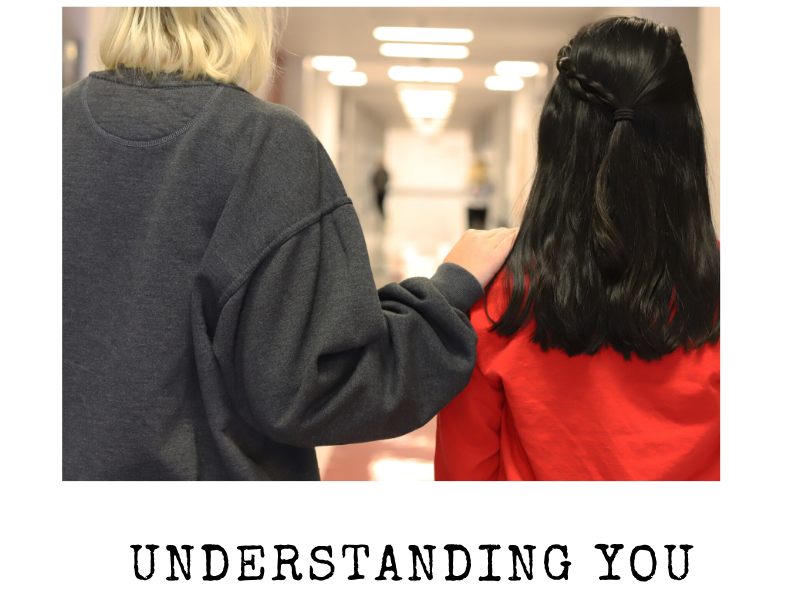Understanding Psychology Terms
Common words that sound the same, but aren’t
Mental health is a huge subject to teens nowadays, as it should be, but it isn’t fully reciprocated into society as far as delving into the common misunderstandings of psychology. Words can make all the difference when trying to take care of yourself or others.
December 4, 2019
Mental health is a huge subject to teens nowadays, as it should be, but it isn’t fully reciprocated into society as far as delving into the common misunderstandings of psychology. Words can make all the difference when trying to take care of yourself or others. In this analysis, we will be exploring words like sympathy and empathy, self-worth and self-esteem and happiness and joy.
When it comes to caring for a person, it’s important to know the approach that you’re going in with. Many people confuse the two, but the difference is important. In order to fully understand, let’s use a scenario.
In this video voiced by Dr. Brené Brown, she highlights a scenario with a bear and a fox. The fox is in a dark place, her marriage is falling apart, her kid is getting kicked out of school and she has a dark rain-cloud above her head.
In situations like these, it’s all about relations. Empathy just doesn’t come without trying. With sympathy, it’s just like offering that sandwich and ushering them back to the light. It’s letting people know they’re going to be there for you, but they’ll be waiting in the wellness waiting room until you get back from your long visit to the darkness.
Empathy is about getting down and dirty with people and giving time for healing and growth. Be able to meet people where they are, don’t try to change their location just sit with them for a little bit, how do you think they feel in this situation?
Now I’m not trying to villainize sympathy, because genuinely sometimes that’s the only thing you can do, maybe the relationship isn’t strong enough, maybe the situation is unlike what you’ve experienced before, whatever it is it’s okay sometimes.
But the important thing with empathy is to be able to sit where you might’ve been once and help someone out. Wait to share your story and live theirs for a little while.
Now in order to take care of yourself essentially, I feel like knowing the difference between these two is important to increase awareness for yourself. Looking at them at first you can see that yes they both have the prefix of self, but the second word that follows starts the differentiation.
So again, I want to start off with a scenario. This is something my therapist had me do one meeting and it was cool to hear her responses to it. I want you to close your eyes (after you read this) and imagine if everything were to be taken away from you, your family, your house, your education.
Obviously, you would be devastated right? But look past that how would you feel if you only had yourself, what would you still have? I’d still have my strong voice, I’d still have my nose to smell magnificent things, I’d still have my ears to listen, right?
What does this mean exactly? When you have seemingly nothing but yourself to support you, what do you have good? This is a good representation of your self-worth (aka: Believing you are a genuinely good person with good characteristics.)
Self-esteem is more of a fluctuating concept as time goes on. You could have healthy self-esteem or unhealthy self-esteem, but it’s something that can always be worked on in certain situations.
Unhealthy self-esteem isn’t always low self-esteem either, it’s having an unrealistic view of yourself. Either thinking too highly of yourself and drifting into the narcissism zone or drifting into the zone of low self-esteem where you are completely disregarding the positive aspects of yourself. Regardless, don’t let your faults or your weaknesses or your mistakes disregard the definite great traits that you possess.
I think the difference between these two is important because not only are these the foundation for the relationship with yourself but your relationships with others. Plus, the more you believe in what you do, the more success and well-being you are going to have, right?
Are you happy? Hold the phone, that’s a hard question, isn’t it? To be honest, it’s not that complex of a question though. Happy is such an elementary concept, like Johnny is happy because he has mac and cheese, Johnny is sad because his dog ran away.
Happiness is when that one thing goes ok like you are making good money, or you painted your nails a pretty color, or you feel like your life is going pretty ok. Happiness, I feel like is short-lived, it’s hard to force yourself to be happy because when it’s true, it’s shown.
Joy is a whole different story though. Joy is a choice, like even though things are rough, or maybe things are ok, but regardless you keep being grateful for all the good things you have, and finding the little things to be happy for. Now let’s try this.
Are you joyful? Much easier right? That’s all for now though folks. If you liked this leave some comments for feedback.
Links for Reference:
https://www.youtube.com/watch?v=1Evwgu369Jw&feature=emb_title













